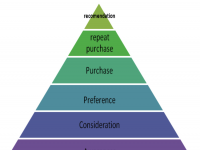Brian Hart is my podcast guest this week.
I hadn’t known he was going to say that he’d never needed to look for customers when I invited him to be a guest on my show.
I invited him because I’d read several of his articles on Inc. Magazine, learned about him through Twitter and LinkedIn, and thought he could bring value to my podcast listeners – most of whom are entrepreneurs.
Category: Market Strategy
The marketing technocrats are the second biggest danger to your entrepreneurial business success. You are the first.
I remember my first days as NOKIA VP of Marketing for the Israeli market. I came to NOKIA after more than 18 years of executive marketing positions with leading brands and multimillion dollar budgets.
It was my first meeting with my internet manager – a new role in the marketing team. She looked at her reports and said: there were 335 thousand youth and young people viewing our last campaign.
As I said, eighteen years a marketing manager and VP for leading brands, spent millions of dollars on different marketing activities and ads, but I had never known exactly how many people actually saw the campaigns.
The Eight Golden Rules of Entrepreneurial Marketing* Part 2
This is the second part of the The Eight Golden Rules of Entrepreneurial
Part 2 – The Next Four Golden Rules
In the previous part, we defined the four most basic rules at the heart of customer focused market strategy. Any marketing success we have builds upon those basic rules.
The Eight Golden Rules of Entrepreneurial Marketing* Part 1
Entrepreneurs are aware of the need to maximize their company’s value (which is built on two foundations; the financial results [sales and profit] and its brand perception).
They also know that they have to market their startup and dedicate thought to the question of how to reach customers and make them want, seek out, use, and purchase the product. However, few entrepreneurs are aware of the fact that there are clear rules underlying marketing, in general, and the marketing of start-ups or entrepreneurial business, in particular. They also fail to realize that by following these rules, they will significantly increase their odds of making a quick breakthrough into the international market.
There are eight rules. The first four relate to the most basic questions of marketing a startup – the company’s market strategy. The last four relate to reaching the customers and motivating them to buy and use the product.
Is there any chance for entrepreneurs to succeed with a physical electronic product?
During my first 22 years of marketing and sales, I worked only with physical products, like food, suits, batteries, and mobile phones. Mainly, but not only, consumer products.
And then in 2008, I began working with startups and entrepreneurs, and shifted my focus to mainly software, systems, online platforms, and etc. There were very few consumer electronics products in the startup nation at that point.
How entrepreneurs can build the best customer journey
Starting a new year is the perfect opportunity to introduce new things:
Especially if it can lead you to new heights of paying customer and revenue.
…and it all starts with a triangle
I joined Nokia in 2004 as the VP of marketing for the Israeli market and part of the international marketing team.
Guest Post: Blogging – Expanding Your Horizons
Thinking of starting a new business? Perhaps you have a new idea and you’ve been brainstorming tirelessly about how to introduce it to the world? Then blogging is what you need.
How important are the name and logo for your entrepreneurial business, really?
I love the story of how Google chose their name. It shows an interesting process of naming a new startup or entrepreneurship.
How to choose the best name and logo for my business is one of the most asked questions among entrepreneurs and new business owners.
It makes sense. First, because this is what we do, right? When a new baby is born, the first thing we do is give them a name. The name differentiates us from every other person in the world -together with many other parameters- still; everything starts with the name.
SEO? Blog Content? PR? Email marketing? Social media presence? Trade shows? Webinars?
As an entrepreneur, how should you choose which marketing activities to focus on?
One of the startups I loved working with was B4UPay . I believed they would succeed and trusted the two founders to do good work. And they did. But then they closed the company. Much too early. For the wrong reasons.
And I was devastated because they did everything right… Almost!
The company closed because the cost per lead and cost per customer were too high, and they realized they weren’t able to be profitable.
Finding the right marketing tools for specific audiences at different stages of the entrepreneurial company is challenging.
The truth about the chances of an entrepreneur to succeed
This episode is the last and final part of my 1st year anniversary special events.
The issue of entrepreneurial and startups success rate seems to be a major issue. There isn’t a question about the high chances of failure.
Did you ever ask yourself why? 20 years ago, establishing a startup involved trying new and unfamiliar technologies, which had quite a high chance of failing. But today, most of the startups are about new habits or better ways to organize traditional processes. Most of the technology is mature, and it seems like there shouldn’t be such a high percentage of failing startups and entrepreneurial businesses.
How come successful entrepreneurs fail?
Because you can’t trust luck. But you can trust customers’ behavior, when tracked correctly.
I was lucky to interview Marc Hemeon on my podcast. After scheduling the interview, Marc sent me a message making sure I know he quit Tech and is no longer part of the entrepreneurial world.
Marc’s fantastic story is relevant for many entrepreneurs. “Today, I’m a ‘recovering entrepreneur’.” Marc told me. Last year, I closed a startup that I had founded in California; I sold my house and took a break from 20 years of tech. Right now I’m painting and doing art in the North Shore of Oahu.”
Marc didn’t tell me right away that just before this last startup, he co-founded two very successful startups; Fflick, which was acquired by Google and YouTube a month after the launch while they surprisingly experienced a hype they couldn’t even dream of. The second was a startup he launched with his friend, it was an app for luxury watches and within less than two years they merged with the global leading company in the world of luxury watches.
Are you using the best business model for your entrepreneurial business?
There are more options to make money today than ever
We are celebrating the one year anniversary for my REACH OR MISS Podcast.
If you had asked me two years ago if I would ever have a podcast, I would have thought you were mixing me with someone else.
I never planned to leave my corporate marketing executive roles. But one day, I had an odd idea of inventing a new model of marketing for entrepreneurs and startups and went to establish my business.
On my podcast (the one I never planned on starting), I interview successful entrepreneurs; most of who got up one morning and wrote a blog, or created a podcast, or launched a new direct PR model for entrepreneurs, and grew a company of 18 employees around it within a few years.
There is a new kind of entrepreneur. If you are reading this, you are probably one of them.
John Lee Dumas (JLD) is the founder and host of the leading entrepreneurship podcast, Entrepreneurs on Fire, and is one of the founding fathers of this new age of entrepreneurship.
John established his podcast after finding himself unhappy with traditional 9 to 5 jobs, and frustrated with the weekly podcasts he listened to on the road because there wasn’t enough content. So he decided to create a daily podcast for entrepreneurs. It quickly became a huge success and John, along with Kate Erickson, his partner, built a successful seven figures business around the podcast.
Reaching entrepreneurial business success through leading your (new) market category
I first discovered the idea of market category more than 20 years ago, in the book that became my guide in marketing, “22 Immutable Laws of Marketing” by Al Ries and Jack Trout. I was a young marketing manager that was, for the first time, responsible for leading the marketing and sales for the largest beekeeper and honey factory in the country.
How will Market Analysis help you in your fundraising?
Raising a fund for your startup is challenging.
Often it can seem like an impossible mission.
Yet, in my experience with hundreds of startup companies, your chances to get an investment to your startup will be based mainly on two factors:
You are the type of founder the investors trusts to succeed.
You manage to convince the investors there is true potential and need for your product in the market.
These are the two things you should focus on in your presentation.












